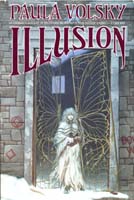 Illusion
Illusion
by Paula Volsky
A book review by Mark L. Olson
Bantam Signet 1992, $10.00, 577 pp
Illusion is another novel set in Volsky's fascinating like-Earth-but-not world where magic meets the 19th century. This story is set in Vonahr, which is a close parallel with France in our world. It's set in our world's 1780s, and Vonahr is ripe for revolution. Its king and Exalted classes live only for their wealth and pleasure and oppress everyone else to generate the needed cash. It's a fabulously glittering society.
Unlike the aristocracy of Louis XVI's France, the Vonahrish nobility are called the Exalted because of they are master of illusion, a powerful magic which has kept their class in power for centuries. Not much longer, however – times are changing and the King and the Exalted are very busy ignoring the warning signs.
(As always in this series of books, each nation has its own characteristic brand of magic. Vonahr's seems to revolve around the production of multi-sensory illusions (potentially so powerful that they're as effective as a prison for restraining someone) and conversing with and animating the inanimate. Nicely done!)
The story follows Eliste vo Derrivalle, an Exalted girl, as she goes to Shereen the capital to be presented at Court. She's an immediate success and quickly becomes one of the court's sought-after beauties just before things begin to crumble. Peaceful and reasonable demands are ignored and even suppressed violently and soon rabble-rousers lead mobs into the palace, forcing the king to call a constitutional congress. As with our own French, this quickly turns into a revolutionary government run by radicals and sworn to exterminate the Exalted.
Eliste goes into hiding (one of the most well-carried out parts of the book, especially in the use of the seasons to emphasize it) and finally onto the streets in anonymous poverty until she is succored by a member of the liberal opposition who opposed the king and the Exalted when they were in power and now oppose the radicals.
Through all of this is the thread of magic: Eliste's uncle Quinze is one of the great masters of the craft, but prefers to live in privacy in his cottage hidden from the world by barriers of illusion. Magicians under the control of the radicals have re-energized several Sentients, magical automata created centuries ago to protect the kingdom, but now use them to oppress it. Eliste has learned a lot during her descent into poverty and calls on her uncle to help and he does – but only enough to neutralize the magical help that the radicals have. Once that's done, Uncle Quinze (and Volsky) is smart enough to let the action move back to people acting for themselves.
(One of the strongest things about Volsky's writing is that she's got the knack of including just enough of the fantastic to make a book really interesting, but not so much that real people don't count any more.)
The tide flows back and forth for 500 or so fascinating pages. It's a great story filled with interesting people and a fascinating milieu.
(That same Vonahr a century later is the setting of parts of the excellent The Grand Ellipse.)
About the only complaint I have about Illusion is that Vonahr is just a bit too much like France and the similarities jar.
Still, like the other Volsky books I've read, I highly recommend Illusion.
See my reviews of other Paula Volsky books: The Grand Ellipse, The Wolf of Winter, The White Tribunal, Illusion
NESFA homepage | Review Index | More Reviews by Mark L. Olson
